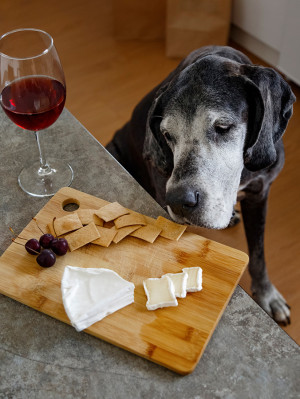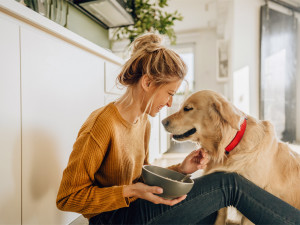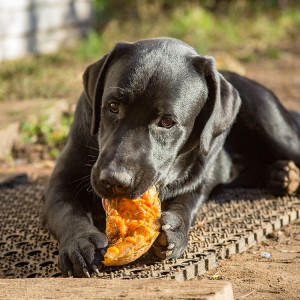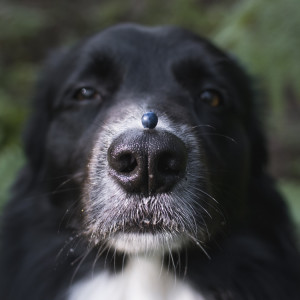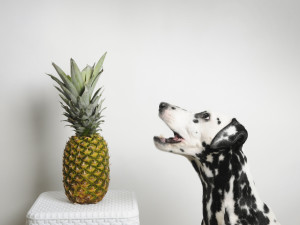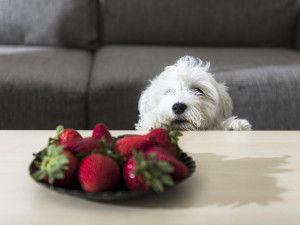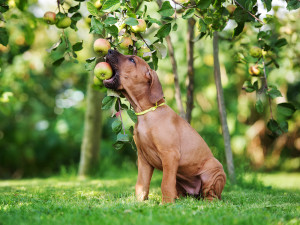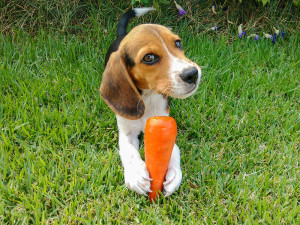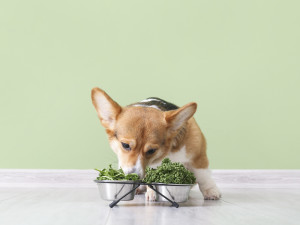Can Dogs Eat Broccoli?
Find out how to safely get your pup their greens.
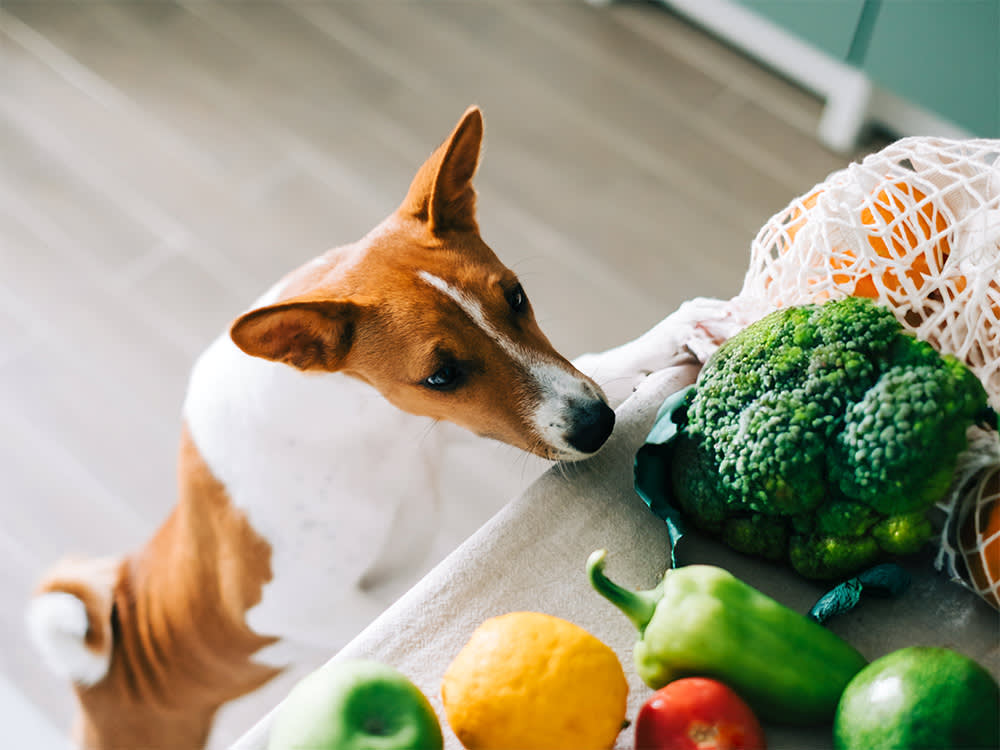
Share Article
Broccoli can be a nutritious snack for dogs and has the extra benefit of easy preparation. Broccoli has lots of fiber and essential nutrients, and may be a good option for pups on a weight loss plan. But dog parents should remember that all treats (even nutritious ones) should be fed in moderation. Going overboard with broccoli can cause gastrointestinal upset and lots of dog farts.
Nutrition Facts: Broccoli for dogs
Broccoli (Brassica oleracea var. italica) is abundant in vitamins, minerals, and antioxidants. Broccoli is a high-fiber, low-calorie veggie, and one that many dogs enjoy. While broccoli may not be the super power food for dogs that it is for humans, it can still be served as a healthy snack option. Potential health benefits of broccoli include:
Fiber: Dietary fiber helps a dog’s intestinal health by increasing fecal bulk, balancing moisture content in the stool, and regulating bowel motility. It also helps maintain a healthy population of “good” bacteria in the gut.
Vitamin C: Vitamin C is a potent antioxidant that helps support immune health.
Vitamin K: Vitamin K plays an important role in blood clotting and contributes to bone health.
Potassium: Potassium is an electrolyte that aids in nerve and muscle function.
Low calorie: Broccoli can easily be given as a treat with little worry about additional calorie intake.
Is broccoli good for dogs?
While broccoli is a good source of many essential nutrients, it is not a necessary component of a dog’s diet. Feeding a complete and balanced diet made specifically for canines will provide all of the nutrients a dog needs. Broccoli should only be used as a fun snack that is healthier than many alternatives. The fiber content in broccoli can make some dogs pretty farty, and too much broccoli can cause stomach upset.
Can dogs eat raw broccoli?
Dogs can eat raw broccoli, but dog parents should be mindful of the size and quantity they give their dogs. Raw broccoli, especially the stalks, can be difficult to break down, so large pieces can pose a choking hazard or risk causing intestinal obstruction. If offering raw broccoli, dog parents should opt for broccoli florets or ensure that pieces of the stalk are small.

Is broccoli completely safe for dogs?
Broccoli is safe for dogs as long as it’s in moderation. While broccoli is nontoxic for dogs, it’s not ideal for use as a major component of their diet. Broccoli contains a substance called isothiocyanate, which can cause gastrointestinal irritation when consumed in large amounts.
How to feed broccoli to a dog
Dogs can be offered broccoli raw, steamed, or boiled — however they prefer it. Always wash the broccoli thoroughly to reduce the risk of food-borne illness. If feeding raw, stick to feeding florets and be sure to cut the broccoli into bite-sized pieces to reduce risk of choking or intestinal obstruction. No preparation of broccoli should include any seasoning, so skip the salt, spices, and other flavor additives. Consider this veggie as a treat and not a major part of your dog’s diet. If a dog develops any gastrointestinal upset, like vomiting, diarrhea, or intense farts, stop feeding broccoli and choose a different veggie treat.
The bottom line: Can dogs eat human food?
There are plenty of dog-safe veggies for your pup to enjoy. Best practice would be to consult with your veterinarian before offering any new foods or treats, especially if your pup has any pre-existing health concerns. Dogs should get all of their essential nutrients from dog food, and treats should be limited. No treat or human food should make up more than 10 percent of a dog’s diet, and that includes veggies.
Other foods that are safe for dogs
Green beans: Many dogs love green beans. Fresh green beans are commonly used as a low-calorie snack for dogs who need to achieve or maintain a lean body condition. Green beans can be fed in many forms — raw, steamed, or boiled — depending on what the dog prefers. Dog parents should be careful with canned green beans, though, because many can be high in sodium.
Apples: Apples can be a fun, crunchy treat for dogs. Be sure to remove the core and cut apples up into small pieces in case your dog gets too excited to chew properly. If applesauce seems more appealing, choose a low sugar option.
Carrots: Carrots are another crunchy, sweet treat that dogs love. While carrots may satisfy a dog’s sweet tooth, this high-sugar veggie should be limited (or avoided) in dogs that are diabetic or obese.
Other foods that are dangerous for dogs
Onions: Feeding onions to a dog is a definite no-no. This includes both raw and cooked onions, onion powder, onion dip, and even onion soup. Onions and other Allium species contain a substance called N-propyl disulfide, which can cause red blood cell destruction and severe anemia.
Grapes: Grapes and raisins, which are just dehydrated grapes, are toxic to dogs. Grapes and raisins are known to cause gastrointestinal upset and acute kidney failure in dogs.
Avocados: Avocados can cause vomiting and diarrhea in dogs due to a substance called persin. The pit also poses a risk for choking or intestinal obstruction.
FAQs (People also ask):
Is broccoli toxic to dogs?
Broccoli is not toxic to dogs but should only be fed in moderation. Feeding large amounts of broccoli to a dog can cause unwanted flatulence or gastrointestinal upset.
How much broccoli can a dog eat?
All treats, including healthy vegetables, should not make up more than 10 percent of a dog’s diet. Although broccoli contains lots of essential nutrients, dogs should get sufficient nutrition by eating a complete and balanced diet formulated for dogs.
References:

Dr. Alycia Washington, DVM, MS
Alycia Washington is a small-animal emergency veterinarian with over 10 years of experience based in North Carolina. She works as a relief veterinarianopens in new tab and provides services to numerous emergency and specialty hospitals. She also works as a veterinary writer with a focus on educating pet parents.
Related articles
![A close up view of a dog with a blueberry resting on its nose]()
Can Dogs Eat Blueberries?
Yep—blueberries are a fiber and antioxidant-packed snack for your pup.
Can Dogs Eat Pineapple?
Pineapple is a healthy, sweet treat for dogs—as long as you feed it to your pup in moderation.
Can Dogs Eat Strawberries?
In moderation, strawberries are a tasty, healthy treat for your pup.
![Ridgeback puppy eating an apple from a low-hanging tree]()
Can Dogs Eat Apples?
Here’s why this fiber-filled fruit is a healthy treat for your dog.
![Beagle puppy dog holding a peeled carrot in its front paws sitting in the grass]()
Can Dogs Eat Carrots?
Yep—this crunchy, sweet vegetable is a great addition to your dog’s diet.
Can Dogs Eat Kale?
Yep — this superfood is good for your dog in small amounts.

